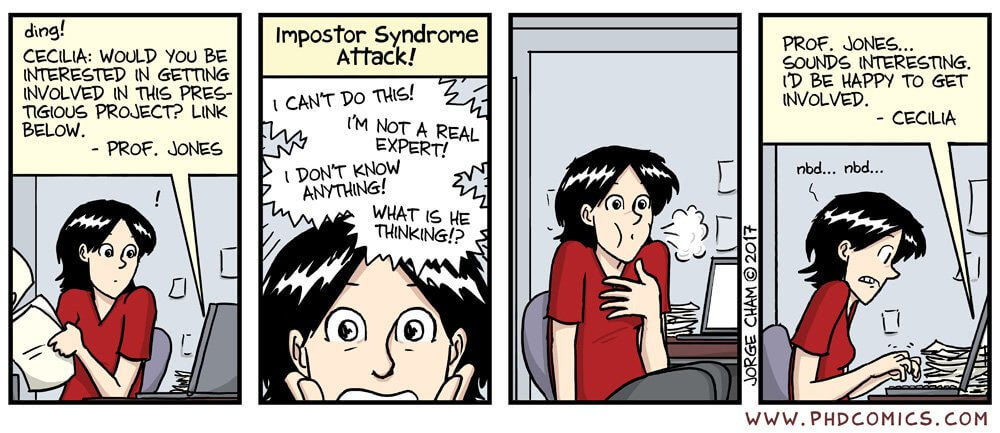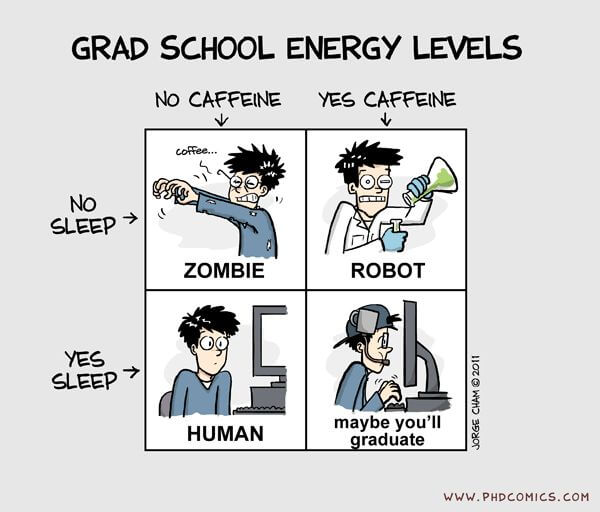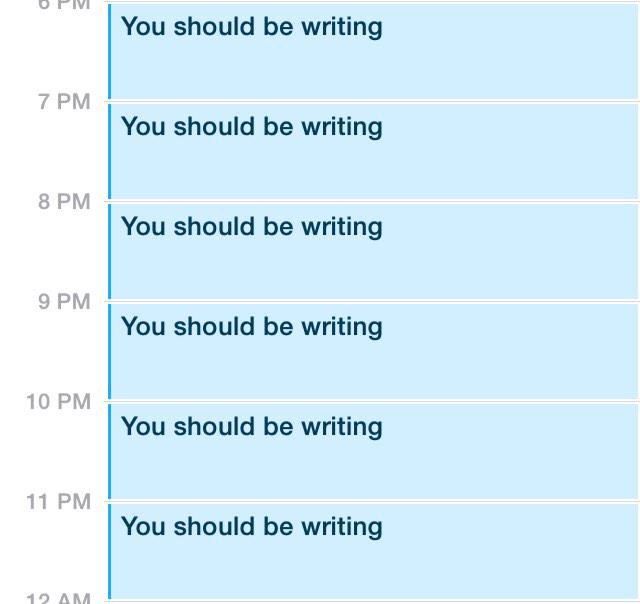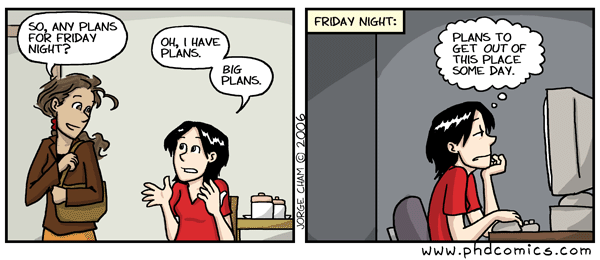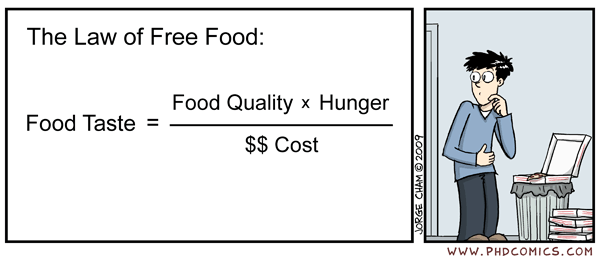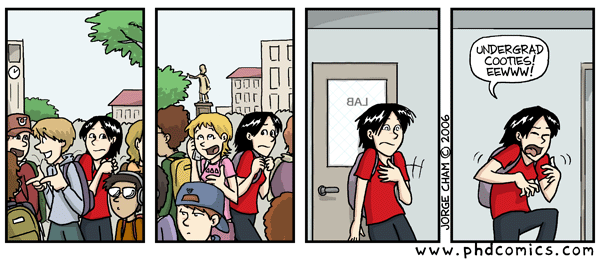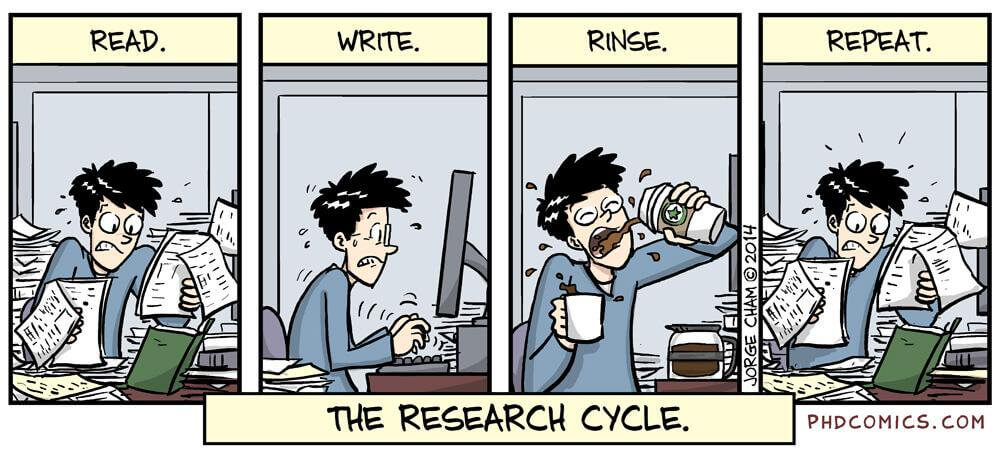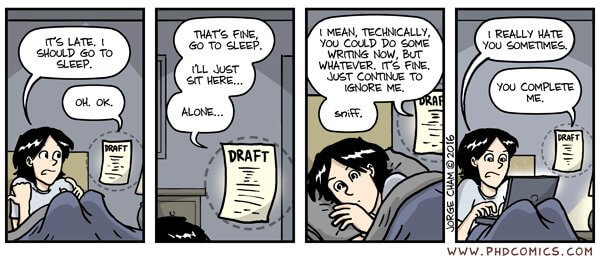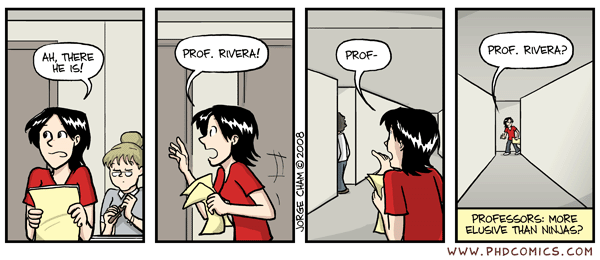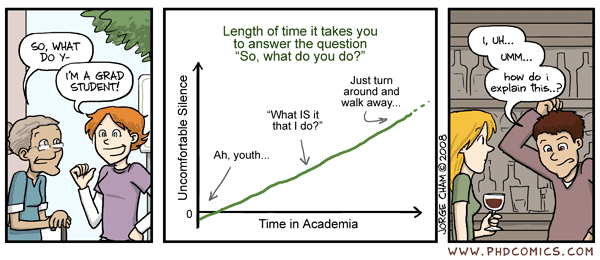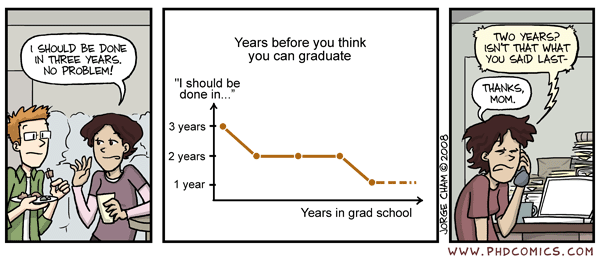Life as a graduate student is never easy. Sure, your numerous accolades are, to many, achievements of a lifetime. Your advisers and peers look up to you in awe and assume all your hardships will all be worth it. “What a future success you must be!” is most likely in the minds of complete strangers. They look up to you for your persistence and hard work. To them, it’s respectable and admirable that you are able to balance school, keep your job, and meet family obligations–all while pursuing that coveted Ph.D.
If only they realized what exactly you have to go through every day (and how much of a mess you are at some point!), they would see past the prestige that is associated with being a Ph.D. student.
Whether you choose to go down the road of Ph.D. in Law, Medicine, Engineering and more, life in graduate school definitely has its pains and struggles that test your character. What is alien to the outside world is how grossly different college is from grad school. If college is limbo, graduate school definitely is hell. There are frat parties in college and an entire school year of college benders. College is fun.
Graduate school, on the other hand, is painful. Students will attest to the fact that in more ways than one, being a Ph.D. student means having to give up some of life’s biggest pleasures, such as social life and luxuries.
We are constantly broke. But that’s not all there is to it. We are in our twenties and supposedly enjoying the best years of our lives. We were confident we would figure everything out at this point. Oh, how we thought wrong! In reality, we are stuck in what seems like an eternal love-hate relationship with the academia.
No matter what field you are researching, Ph.D. students have these things in common: the good, the bad, and the downright ugly days. All is well, they say, because they are part of the struggle; the ebb and flow of graduate study. Here’s a silver lining: despite the toughness of the entire experience, there is always someone who does have a clue: fellow students and Ph.D. holders themselves!
Here’s to the ones who know about and completely relate to the struggles only a Ph.D. student would understand!
Struggles of a Ph.D. Student
Entering graduate school and actually finishing are two different things. But both can be equally daunting tasks. Today, we are highlighting some (not all, as we are not trying to put everything in a box) of the biggest struggles a Ph.D. student faces day-in and day-out. We put this together in the hopes of being of help to you, a struggling Ph.D. student yourself and perhaps those who are willing to take this same exact road in the near future.
Remember, you are not alone on this one. Ph.D. students around the globe sympathize with you. You will get through this part of your life and realize that indeed, it is worth it. So loosen up a little. How about you take a shot of espresso each time these struggles become too familiar? You might need that caffeine boost to get you through the night. Besides, you have a chapter to finish!
Fear of isolation
Much too often, Ph.D. students feel isolated from the world and from their peers. The fear of isolation stems from the fact that they mostly work alone. If they have a team, it is mostly just composed of a few people helping on a project. No wonder most Ph.D. candidates feel alone, therefore unmotivated. A telltale sign of this fear getting into you is the constant thought that you are completely alone and no one understands you. This usually happens when your research becomes too complex that no one, not even you (let’s be honest!), can understand anymore!
Working alone is by design. But, of course, you knew that the moment you entered your graduate program. This is why you need to network! We know that socialization can be a waste of your precious writing time, but you need it for your sanity. Grab a drink with your grad school buddies in a bar across the street or just have coffee. Talk about the weather or the state of US politics, whatever floats your boat. Just hang out with your colleagues to shake off that fear of isolation.
You do not want to reach the point where you Google “how to make friends.”
Impostor Syndrome
You feel like an impostor every day.
Every day you start to question whether or not you are qualified to study what you set out to study. Put simply, the impostor syndrome (impostor phenomenon or fraud syndrome) asks the nagging question: Am I a fake?
If it is any consolation, you are not alone. Most, if not all graduate students, question whether or not they are ready to do the work they do. All they know is that a Ph.D. is something clever people pursue. When you finally are at that starting point, you keep waiting for the time when you start feeling clever. But soon you will come to the haunting realization that it will never happen. What is scarier is that you actually start to become paranoid about the possibility that the university might, for some reason, withhold your doctorate degree come graduation day.
Here is the thing, you can easily overcome impostor syndrome. Cut yourself some slack! Yes, you are surrounded by high-achieving individuals, and it is perfectly normal to feel like a fraud. But it is important to remember that you, too, are more than capable of greatness!
Stress is an understatement
Often times, stress is destructive. With deadlines coming at you like bullets, mountains of papers to review and submit, and a study grant in hot water, saying that you are under a lot of stress is an understatement. Extreme stress is unhealthy but you know that already!
Unfortunately, graduate school has become the breeding ground for extremely stressed, anxious and depressed students. But, all is not lost. There is hope for you. Yes, working your way through a Ph.D. degree is hard. It is supposed to be hard! Do not allow stress to paralyze you.
Caffeine runs through your veins
Caffeine is any graduate student’s best friend. After all, it is the world’s most popular psychoactive substance. You cannot function without caffeine. Going through the day becomes impossible. Coffee, tea, blended coffee-based drinks if you like drinking your dessert; whichever you prefer to get your caffeine fix.
We will give this one to you. You do not only consume caffeine to stay alert, but you also take it for the mental health benefits. There are downsides to drinking too much caffeine, sure, but we will let it slide. You need it to survive graduate school. So, go on, get that brain boost! Just remember that there is such a thing as “too much caffeine”.
You’re boring… you even bore yourself
All kidding aside, you can be boring sometimes. We get it. You, more than anyone, would like to have a normal conversation with your friends and family and have a good time with them. After weeks or months without seeing them because deadlines are pulling you from all directions, you just want to be normal with them for once. But you always fail.
Being boring is almost always a negative thing. But as a Ph.D. student, you are struggling with this every day. Who can blame you? After being immersed in research work, you seem to forget how to have a casual conversation. Or simply be present.
As a Ph.D. student, expect yourself to be working all the time. You go in as early as you can and leave the office late. However, this is not a sustainable lifestyle. You need time for hobbies, friends, and family. All these keep you motivated and probably allow you to appreciate humor. Not everyone gets dry humor which Ph.D. students tend to have. Most importantly, nobody likes an intellectual snob!
By the time you finish your research, try not to talk about it for a long time and focus on doing what will keep you healthy emotionally, physically, and mentally.
You forget how to date
How can you possibly focus on the person in front of you when your phone keeps reminding you that “You should be writing”? You are too out of touch that you are unsure how to have a nice evening off. Because at the back of your mind, you know you have a schedule to stay on top of.
Did you know that not dating while on a quest for that Ph.D. degree is a favor to your prospective partners? You do not want them to be entangled in the years and years of your strict budget and student lifestyle. Let’s face it: your academic brilliance does not necessarily translate to the real world.
However, grad school is a great place to meet people; you know you and your prospect share the same passion for research. The fact that both of you are in grad school is the perfect indicator that you both are passionate about research–and perhaps a perfect match.
Dating, in general, takes work. It demands reciprocity. As a Ph.D. student who is sacrificing sleep for the sight of romance, go ahead. Find someone who can work with you through your years in graduate school. And here’s hoping they like instant noodles or leftover pizza!
Broke? Yes, broke
Financially surviving graduate school is the toughest feat among the many struggles of a Ph.D. student who is living on a super tight budget. You cannot afford to splurge on the good things when a decent meal is hard to come by.
Cheap coffee shops are paradise for you. When the library becomes too crowded or the lab becomes too sketchy (even for you), you go to your trusty neighborhood café to recharge. When we say recharge, not only yourself but also your laptop (because you will write and study). Throw in your phone and tablet as well!
Free coffee refills get you excited! But a buffet luncheon in a conference brings back the glow on your face. You get to eat a pretty hefty meal after so long!
Being broke while in graduate school has become the punchline of many jokes. Unfortunately, this is something Ph.D. students know all too well. Admit it; you have been in a financial crisis since day one. Thinking about rent, necessities, and travel expenses while repaying your college student loans is a part of your daily routine. It is a vicious cycle associated with educational advancement that people don’t usually talk about.
Being mistaken for an undergrad… and liking it
Although the life of an undergraduate student is much different than yours, For one, you probably belong to the older age group on campus and get the occasional second look. It is as if the daily toils of graduate school is not damaging enough, you get mistaken for an undergrad! How crazy is that?
Every day you try to look like you have everything figured out but all that confidence gets thrown out the window the moment you get mistaken for an undergrad. Are they unaware of the terror you need to face just to get through your day as a Ph.D. student? If only they knew.
But to be clear, Ph.D. students do not dislike undergrads. The not-so-secret truth is, they are jealous of them. College students look so fresh. They get to enjoy the little luxuries inside the campus. College undergrads get to enjoy slacking off while all you–a Ph.D. student– should ever do is think about your research.
So please, validate Ph.D.’s by calling them, undergrads. Pay it forward.
Research is your new normal
You have become addicted to studying. What can we say, you love to learn. We cannot argue with that because you chose to spend your twenties in school! But do not worry, all is well. Entering a graduate school is your ultimate academic goal.
As a side effect, you cannot stop studying. You find yourself actually looking for something to study next. You do not mind living in a tiny, single bedroom apartment as long as you get to have the entire space for yourself. After all, you are expected to commit to your studies. You even bring papers to read to bed.
After thinking about your research all day and all night, you end up dreaming about it. If you are lucky, you make amazing discoveries while in deep slumber. The uncontrollable drive to study is something you should take advantage of. But do not forget to take a break – for your personal life and your health.
You don’t know what sleep is anymore
Sleep-deprived is your middle name.
The most difficult conundrum all students face: “sleep, social life, or GPA—pick two.” If you are juggling classes, deadlines, and responsibilities as a teaching fellow, sleep could be lost in that cycle. You know the necessity of having a good night’s sleep but unsurprisingly, academic duties get in the way.
The scary part? You have mastered the art of having little to no sleep. You can function. It may not be your optimum productivity, but you can function. According to research, two consecutive nights of less than six hours of sleep can make you sluggish. And it may last for six days. Totally unacceptable, right?
So do not neglect sleep. You are an insomniac, yes, but you need to get some Z’s if you want to keep your sanity.
GET SOME SLEEP.
Hard-to-get adviser
Tough luck.
Among the struggles of Ph.D. students, this is the most counterproductive. Ph.D. advisers or supervisors are supposed to be guiding you, but more often than not, they bring in the extra stress. They yell at you for the tiniest mistake. It feels like it is their mission in life to make you feel incompetent (read: stupid). Aside from them being hard to please, they are always missing in action!
Why is the student-adviser dynamic so difficult? It is either you respect your adviser or you loathe them. That said, some students are lucky to have an adviser who truly cares. Advisers who foster a healthy, long-term relationship with graduate students–bless their souls!
Ph.D. is built around the relationship between the adviser and the advisee. It influences the flow of knowledge production. Anyhow, you have no choice but to deal with your adviser. There is no other way around it.
Commit and stay on top of your game. You might win him or her over!
Having an existential crisis whenever a stranger asks, “What do you do?”
Ah, the question that triggers an existential crisis. Oftentimes, this comes from innocent, friendly strangers who are trying to spark a conversation. It is a valid question, yes, but is it polite? We side with the negative.
It is as if your life as a graduate student is not torturous enough, this question is poison. This is the reason why you stopped going to family get-togethers. You got sick of hearing and having to formulate a comprehensible answer. Just stop asking Ph.D. students “what they do” because if they knew, they would not be spending extra years in the university to earn that diploma.
But hang in there, everything will be worth it. You are bound to understand the most perplexing phenomenon in the world.
Lack of motivation
You often lose track of your goal. Getting too deep into graduate school, you might lose grasp of why you are there in the first place, Guess what? That is perfectly normal. All you need to do is to discover (or rediscover) what it is that motivates you. This might come from the most unexpected of places. If you do find it, do not let it go.
Literally, motivation is what drives you to do things. You need the motivation to write your thesis, to grade your students’ papers, or to simply stay awake (coffee!). Power through your off days. Try your best. You will get through that, eventually.
…still, you can’t wait to correct people, “It’s Dr. …”
You have rehearsed the perfect way of correcting people to address you as “Dr.” We completely understand. You did not spend years and years of your life in graduate school only to be called by your first name. Having a Ph.D. is an amazing credential! It proves your passion for research and rightfully validates your quest for knowledge.
As your graduate program comes to a close, insist that people call you Dr. Claim what is rightfully yours!
You earned it!
Final Thoughts
No matter how difficult completing a Ph.D. promises to be, know that it will open up for you a world of career opportunities in the real world. Graduates can be confident that they have learned a great deal about their field of study. It is an accomplishment that only a few people are able to achieve. You are an expert now. Embrace that.
BUT there is no shame in calling it quits. If you think these struggles are something you are not equipped for or ready to handle, you have the choice to just pack your bags and leave. Put yourself first. If the urge to go back to school haunts you, weigh your options well before deciding to continue.
Remember, you are doing this for your own advancement. Follow your pace. You will get there.



